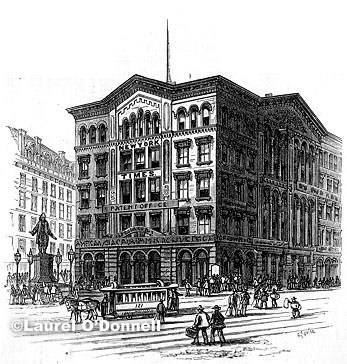|
|
The Metropolitan Newspaper, continued
ting down" began, and some of the writers saw articles that had cost them hours of research annihilated by the stroke of a pen, or reduced from columns to paragraphs - not on account of unimportance, but simply because there is always a superfluity of matter, contrary to the erroneous notion that the editor's great difficulty is to fill his space — and in some instances even the paragraphs were finally omitted to make room for unexpected news that arrived later. Telegrams were still coming in at half past two, but soon after that hour one dispatch brought the words "good-night," and that meant the closing. The night editor and his assistant now disappeared into the composing-rooms, where they remained to superintend the making-up of the forms, and the men at the desks prepared to leave, or threw themselves back in their chairs for a chat and some more smoke.
The composing-room at night is all a-glitter with lights strung under reflectors, which throw the strong beams down on the type-setters, who are actively fingering the little metallic letters. The paper columns of manuscript are transformed to leaden ones, and the leaden ones are framed into pages of six, seven, or eight columns each. Then the pages are stereotyped, by which process duplicate or triplicate impressions are taken of them, and they are finally put on the press, which finishes the business of making the paper.
In the neighborhood of the newspaper offices in Printing-house Square and on Park Row there are several queer basement restaurants, where coffee and cakes or other simple refreshments are sold for ten or fifteen cents. During the day their patronage comes from newsboys and shoe-blacks, but after dark they are popular with the journalists, who gather around one of the common little tables to eat a modest supper before going to their homes. Liveliness of conversation after such work as the slaves of the lamp have done would scarcely be expected, but the writer has heard many and many a brilliant story in these symposia, and has seen men with world-wide reputations sharing the hot buttered cakes and somewhat suspicious coffee. Later they go to their homes, and before they are in their beds their paper is issued. Thousands buy it and read it and grumble at it, and only a few of the more reasonable and reflective ever think what a prodigious embodiment of thought and action it is, and how dull and much worse the world would be without it. To begin at the |
||
|
Page 4
Books & articles appearing here are modified adaptations
from a private collection of vintage books & magazines. Reproduction of these pages is prohibited without written permission. © Laurel O'Donnell, 1996-2006.
|
|||



